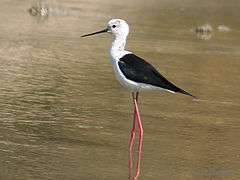Stilt
| Stilts | |
|---|---|
 | |
| Adult H. h. himantopus | |
| Scientific classification | |
| Kingdom: | Animalia |
| Phylum: | Chordata |
| Class: | Aves |
| Subclass: | Neornithes |
| Infraclass: | Neognathae |
| Superorder: | Neoaves |
| Order: | Charadriiformes |
| Suborder: | Charadrii |
| Family: | Recurvirostridae |
| Genus: | Himantopus and Cladorhynchus Brisson, 1760 |
Stilt is a common name for several species of birds in the family Recurvirostridae, which also includes those known as avocets. They are found in brackish or saline wetlands in warm or hot climates.
They have extremely long legs, hence the group name, and long thin bills. Stilts typically feed on aquatic insects and other small creatures and nest on the ground surface in loose colonies.
Most sources recognize 6 species in 2 genera, although the white-backed and Hawaiian stilts are occasionally considered subspecies of the black-necked stilt. The generic name "Himantopus" comes from the Greek meaning "strap-leg".[1]
Species
- Himantopus
- Black-winged stilt, Himantopus himantopus
- White-backed stilt, Himantopus himantopus melanurus
- White-headed stilt, Himantopus leucocephalus
- Black-necked stilt, Himantopus mexicanus
- Hawaiian stilt or aeʻo, Himantopus knudseni
- Black stilt, Himantopus novaezelandiae
- Black-winged stilt, Himantopus himantopus
- Cladorhynchus
- Banded stilt, Cladorhynchus leucocephalus
A fossil stilt has been described as Himantopus olsoni, based on remains recovered in the Late Miocene Big Sandy Formation of Wickieup, United States.
![]() Media related to Stilt at Wikimedia Commons
Media related to Stilt at Wikimedia Commons